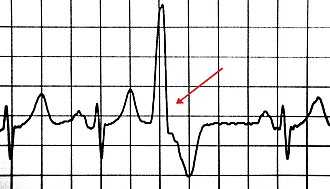Premature heart beat
Editor-In-Chief: Prab R Tumpati, MD
Obesity, Sleep & Internal medicine
Founder, WikiMD Wellnesspedia &
W8MD medical weight loss NYC and sleep center NYC
| Premature heart beat | |
|---|---|
 Premature ventricular contraction (PVC) as seen on an ECG | |
| Synonyms | Premature atrial contraction, Premature ventricular contraction |
| Pronounce | N/A |
| Specialty | N/A |
| Symptoms | Palpitations, fluttering sensation in the chest, dizziness, shortness of breath |
| Complications | Arrhythmia, heart failure |
| Onset | Any age |
| Duration | Varies |
| Types | N/A |
| Causes | Stress, caffeine, alcohol, nicotine, electrolyte imbalance, heart disease |
| Risks | Hypertension, coronary artery disease, smoking, excessive alcohol consumption |
| Diagnosis | Electrocardiogram (ECG), Holter monitor, event monitor |
| Differential diagnosis | Atrial fibrillation, ventricular tachycardia, supraventricular tachycardia |
| Prevention | Lifestyle modification, stress management, avoiding stimulants |
| Treatment | Lifestyle changes, medications, ablation therapy |
| Medication | Beta blockers, calcium channel blockers, antiarrhythmic drugs |
| Prognosis | N/A |
| Frequency | Common |
| Deaths | Rarely directly causes death |
Premature Heartbeat is a common cardiac arrhythmia characterized by an early heartbeat initiated by the heart's upper or lower chambers, disrupting the normal heart rhythm. This condition is also known as premature atrial contractions (PACs) when it originates in the atria, or premature ventricular contractions (PVCs) when it originates in the ventricles. Premature heartbeats are often benign and can occur in healthy individuals without causing significant health issues. However, frequent premature heartbeats may sometimes indicate underlying heart conditions or increase the risk of more serious arrhythmias.
Causes
The exact cause of premature heartbeats is not always clear, but several factors may increase the risk of developing this condition. These include:
- Stress and anxiety
- High caffeine intake
- Alcohol consumption
- Nicotine use
- Certain medications, including decongestants and antihistamines
- Electrolyte imbalances
- Underlying heart disease, such as cardiomyopathy or coronary artery disease
Symptoms
Many individuals with premature heartbeats do not experience any symptoms and are unaware of their condition until it is detected during a routine examination. When symptoms do occur, they may include:
- A feeling of a skipped heartbeat or palpitations
- Fluttering in the chest
- Increased awareness of the heartbeat
- Brief pauses between heartbeats
Diagnosis
Diagnosis of premature heartbeats typically involves a review of the patient's medical history, a physical examination, and one or more of the following tests:
- Electrocardiogram (ECG or EKG) - to detect and record the heart's electrical activity
- Holter monitor - a portable ECG device worn for 24 to 48 hours to record heart activity during normal daily activities
- Event monitor - similar to a Holter monitor, but used for longer periods to capture arrhythmias that occur less frequently
Treatment
Treatment for premature heartbeats may not be necessary if the condition is benign and the patient is asymptomatic. When treatment is required, it may include:
- Lifestyle changes, such as reducing caffeine and alcohol intake, quitting smoking, and managing stress
- Medications to control heart rate and rhythm, such as beta-blockers or calcium channel blockers
- In rare cases, medical procedures like catheter ablation may be recommended to treat frequent, symptomatic premature heartbeats that do not respond to other treatments.
Prognosis
The prognosis for individuals with premature heartbeats is generally good, especially in the absence of underlying heart disease. Most people do not experience significant health problems related to this condition. However, monitoring and managing any potential underlying causes is important to prevent complications.
See Also
This article is a cardiovascular system stub. You can help WikiMD by expanding it!
Transform your life with W8MD's budget GLP-1 injections from $125.
W8MD offers a medical weight loss program to lose weight in Philadelphia. Our physician-supervised medical weight loss provides:
- Most insurances accepted or discounted self-pay rates. We will obtain insurance prior authorizations if needed.
- Generic GLP1 weight loss injections from $125 for the starting dose.
- Also offer prescription weight loss medications including Phentermine, Qsymia, Diethylpropion, Contrave etc.
NYC weight loss doctor appointments
Start your NYC weight loss journey today at our NYC medical weight loss and Philadelphia medical weight loss clinics.
- Call 718-946-5500 to lose weight in NYC or for medical weight loss in Philadelphia 215-676-2334.
- Tags:NYC medical weight loss, Philadelphia lose weight Zepbound NYC, Budget GLP1 weight loss injections, Wegovy Philadelphia, Wegovy NYC, Philadelphia medical weight loss, Brookly weight loss and Wegovy NYC
|
WikiMD's Wellness Encyclopedia |
| Let Food Be Thy Medicine Medicine Thy Food - Hippocrates |
Medical Disclaimer: WikiMD is not a substitute for professional medical advice. The information on WikiMD is provided as an information resource only, may be incorrect, outdated or misleading, and is not to be used or relied on for any diagnostic or treatment purposes. Please consult your health care provider before making any healthcare decisions or for guidance about a specific medical condition. WikiMD expressly disclaims responsibility, and shall have no liability, for any damages, loss, injury, or liability whatsoever suffered as a result of your reliance on the information contained in this site. By visiting this site you agree to the foregoing terms and conditions, which may from time to time be changed or supplemented by WikiMD. If you do not agree to the foregoing terms and conditions, you should not enter or use this site. See full disclaimer.
Credits:Most images are courtesy of Wikimedia commons, and templates, categories Wikipedia, licensed under CC BY SA or similar.
Contributors: Prab R. Tumpati, MD



